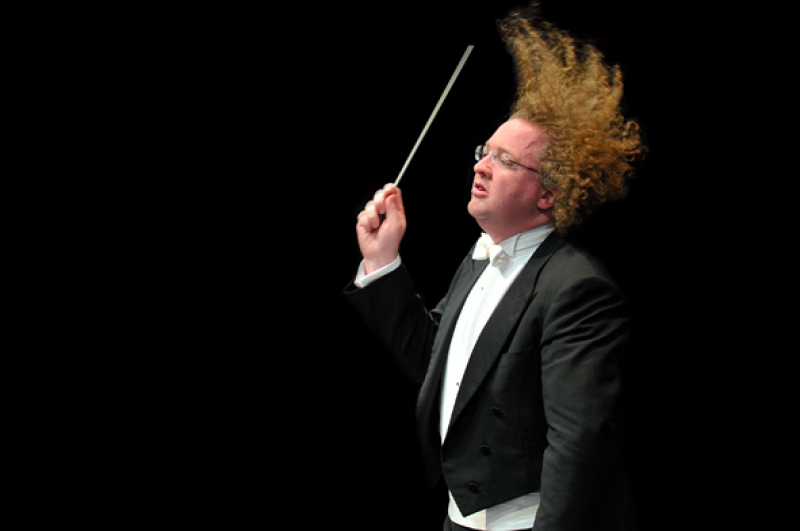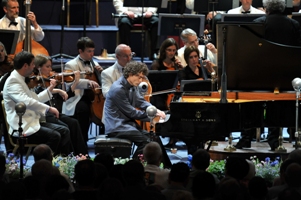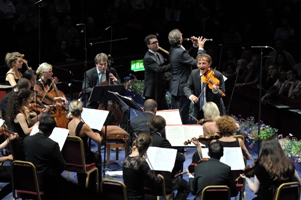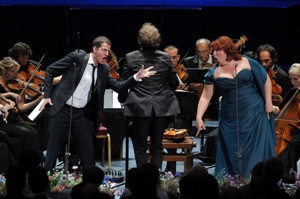RSNO, Denève; Ensemble Matheus, Spinosi, Royal Albert Hall | reviews, news & interviews
RSNO, Denève; Ensemble Matheus, Spinosi, Royal Albert Hall
RSNO, Denève; Ensemble Matheus, Spinosi, Royal Albert Hall
French sophistication meets Italianate fire in two stunning Proms

Is that asking a lot? Probably not, considering what's already been achieved at this year's BBC Proms. Looking back on it, last night felt implausibly rich yet gloriously digestible, too, at least in retrospect. I couldn't have predicted that I would be so swept away by the jam-packed wonders that came from Jean-Christophe Spinosi's Ensemble Matheus and their soloists.
Last night, all four glorious hours of it, began as it meant to end, with an Italian festival viewed through the eyes of the French. And here, right at the start of Berlioz's Roman Carnival Overture, was what I'd been missing in Rattle's first Berlin Prom (wish I'd been at the second, which sounds like it fitted his micromanagement better): not just the rainbow of dynamic effects - Denève managed that in the contrast between the opening flourish and the ensuing string susurrations - but the long vision too, in a cor anglais song (from Zoe Kitson, excellent throughout) which moved at a natural pace but never lost out on Berlioz's multiple details. Denève, like Robin Ticciati, knows how to lift an operatic phrase: that's why I'm so keen to hear him in Berlioz's Benvenuto Cellini, the composer's liveliest opera and the overture's parent work.
Brilliant sonorities in this tricky hall, reaching to my least favourite seat well to the rear of the amphitheatre's semicircle of stalls, seemed to have been tried and tested (you can see it's summing-up time in the last week of the Proms, as I mention the other conductor who seemed to have cracked the venue's difficulties, Donald Runnicles with the other big Scottish orchestra earlier in the season). With the more restricted palette of Beethoven's Fifth Piano Concerto, it was murkier business as usual for the orchestra, despite a splendid lift for the finale's leaping dance which outstripped the soloist; but otherwise Paul Lewis (pictured below right at the start of his Beethoven concertos marathon) had the lion's share of clarity and upper-register gleam.
 Even so, it was not exactly a leonine performance, and I did miss a Russian-school grandeur in the first movement's central double octaves; but on the other hand I've never heard a more convincing cadenza dematerialisation into those weird minor-key oscillations, and as in the first concert, Lewis convinces you that no one trills more elegantly than he does. The central Adagio was as much Denève's triumph as his pianist's: more a completely convincing Andante, a walking-tune tempo of rapt inwardness and lovable simplicity. And the famous transition to the spring of the finale was predictably spellbinding.
Even so, it was not exactly a leonine performance, and I did miss a Russian-school grandeur in the first movement's central double octaves; but on the other hand I've never heard a more convincing cadenza dematerialisation into those weird minor-key oscillations, and as in the first concert, Lewis convinces you that no one trills more elegantly than he does. The central Adagio was as much Denève's triumph as his pianist's: more a completely convincing Andante, a walking-tune tempo of rapt inwardness and lovable simplicity. And the famous transition to the spring of the finale was predictably spellbinding.In their Prom of two years ago, Denève and the RSNO placed a recent Scots work third out of four, and so it was here with the three interludes from James MacMillan's shocking bloodgrudge operatic legend The Sacrifice, the only opera I've seen in the last decade which I could call a total masterpiece. Much of its sense of dread and imminent violence is quickly adumbrated in the interludes, especially the central Passacaglia for a wedding celebration that will end in tears. Yes, there are shades of Peter Grimes here, but MacMillan is master of his own distinctively dense orchestral palette and his underlying tension was vividly energised by Denève in music that - rare among contemporary works - knows exactly where it's going.
It was bold to move straight on to the dazzling, equally clearly etched light of Respighi's Villa Borghese in The Pines of Rome. It's a real Albert Hall showcase with the resounding orchestral chants of the catacomb sequence and the ultimate spatial effects of ancient Roman cohorts on the march, crowned by the mighty organ. But again, Denève made it more than that. The refinement of Respighi's Janiculum moonshine, ushered in by the utterly distinctive clarinet of veteran John Cushing, proved not Hollywoodish but Debussyan - worthy of the master of La Mer and even Jeux. And could you expect to hear a more exquisitely reproduced real nightingale? Only, he pretentiously adds, on a May night in the Abruzzi.
 There was more nocturnal billing and cooing as recorder-player Alexis Kossenko and flautist Jean-Marc Goujon (pictured left with Spinosi and the Ensemble Matheus) caressed each other quite flagrantly in the late-night performance of Telemann's E minor Concerto. But was anyone who didn't know it expecting the gypsy stomping and whooping of the finale? I wasn't, and I adored the shameless hyperactive love-in led by Ensemble Matheus's violinist-director Jean Christophe Spinosi, even if it was so free that at times it nearly fell apart. They started with a sprung sotto voce to back up cuddly countertenor Philippe Jaroussky's Giulio Cesare. What was going on here, you wondered: a feminine countertenor (they can be very butch, you know - those, oddly, are the ones we call male sopranos) alongside a ballbreaking contralto, the adorable Marie-Nicole Lemieux, whom I'd last seen as a Sapphic-in-uniform Mistress Quickly in Richard Jones's Glyndebourne production of Verdi's Falstaff.
There was more nocturnal billing and cooing as recorder-player Alexis Kossenko and flautist Jean-Marc Goujon (pictured left with Spinosi and the Ensemble Matheus) caressed each other quite flagrantly in the late-night performance of Telemann's E minor Concerto. But was anyone who didn't know it expecting the gypsy stomping and whooping of the finale? I wasn't, and I adored the shameless hyperactive love-in led by Ensemble Matheus's violinist-director Jean Christophe Spinosi, even if it was so free that at times it nearly fell apart. They started with a sprung sotto voce to back up cuddly countertenor Philippe Jaroussky's Giulio Cesare. What was going on here, you wondered: a feminine countertenor (they can be very butch, you know - those, oddly, are the ones we call male sopranos) alongside a ballbreaking contralto, the adorable Marie-Nicole Lemieux, whom I'd last seen as a Sapphic-in-uniform Mistress Quickly in Richard Jones's Glyndebourne production of Verdi's Falstaff.As it happened, they ended up playing to the gender reversal, not least in the anything-you-can-do competition of the encore, "Nel profondo cieco" from Vivaldi's Orlando furioso, turned into a justifiably mugged bit of high-versus-low (had Canadian-born Lemieux been watching The Morecambe and Wise Show, and the lady who used to thank everyone for being on her little show?).
 The campery (pictured right) was a welcome bit of relaxation after both had shown their range in other numbers from Vivaldi's stupendous Orlando: Jaroussky his ravishing long lines in another winner, Ruggiero's melting nocturne "Sol da te" with more caressing from Goujon, and Lemieux her histrionics in a very theatrical mad scene. Febrile Corsican Spinosi and his vibrant team, too, rarely let us lie back and bathe in baroque; their Vivaldi concerto for two violins, Spinosi leading alongside the rather less flamboyant Laurence Paugam, spun us ever so elegantly round before the singers' final meeting. So much for late-night smooth classics. I'll certainly be listening again to this while it's on the iPlayer for the next six days, and no doubt more than once. And stop press: I've just discovered that Spinosi, Lemieux and Jaroussky will be giving a concert performance of Vivaldi's Orlando furioso at the Barbican next March. So that's one of those three dreams that's going to come true, even if it won't be at the Proms.
The campery (pictured right) was a welcome bit of relaxation after both had shown their range in other numbers from Vivaldi's stupendous Orlando: Jaroussky his ravishing long lines in another winner, Ruggiero's melting nocturne "Sol da te" with more caressing from Goujon, and Lemieux her histrionics in a very theatrical mad scene. Febrile Corsican Spinosi and his vibrant team, too, rarely let us lie back and bathe in baroque; their Vivaldi concerto for two violins, Spinosi leading alongside the rather less flamboyant Laurence Paugam, spun us ever so elegantly round before the singers' final meeting. So much for late-night smooth classics. I'll certainly be listening again to this while it's on the iPlayer for the next six days, and no doubt more than once. And stop press: I've just discovered that Spinosi, Lemieux and Jaroussky will be giving a concert performance of Vivaldi's Orlando furioso at the Barbican next March. So that's one of those three dreams that's going to come true, even if it won't be at the Proms.All Proms photographs by Chris Christodoulou
Share this article
Add comment
The future of Arts Journalism
You can stop theartsdesk.com closing!
We urgently need financing to survive. Our fundraising drive has thus far raised £49,000 but we need to reach £100,000 or we will be forced to close. Please contribute here: https://gofund.me/c3f6033d
And if you can forward this information to anyone who might assist, we’d be grateful.

Subscribe to theartsdesk.com
Thank you for continuing to read our work on theartsdesk.com. For unlimited access to every article in its entirety, including our archive of more than 15,000 pieces, we're asking for £5 per month or £40 per year. We feel it's a very good deal, and hope you do too.
To take a subscription now simply click here.
And if you're looking for that extra gift for a friend or family member, why not treat them to a theartsdesk.com gift subscription?
more Classical music
 Monteverdi Choir, ORR, Heras-Casado, St Martin-in-the-Fields review - flames of joy and sorrow
First-rate soloists, choir and orchestra unite in a blazing Mozart Requiem
Monteverdi Choir, ORR, Heras-Casado, St Martin-in-the-Fields review - flames of joy and sorrow
First-rate soloists, choir and orchestra unite in a blazing Mozart Requiem
 Cho, LSO, Pappano, Barbican review - finely-focused stormy weather
Chameleonic Seong-Jin Cho is a match for the fine-tuning of the LSO’s Chief Conductor
Cho, LSO, Pappano, Barbican review - finely-focused stormy weather
Chameleonic Seong-Jin Cho is a match for the fine-tuning of the LSO’s Chief Conductor
 Classical CDs: Shrouds, silhouettes and superstition
Cello concertos, choral collections and a stunning tribute to a contemporary giant
Classical CDs: Shrouds, silhouettes and superstition
Cello concertos, choral collections and a stunning tribute to a contemporary giant
 Appl, Levickis, Wigmore Hall review - fun to the fore in cabaret and show songs
A relaxed evening of light-hearted fare, with the accordion offering unusual colours
Appl, Levickis, Wigmore Hall review - fun to the fore in cabaret and show songs
A relaxed evening of light-hearted fare, with the accordion offering unusual colours
 Lammermuir Festival 2025, Part 2 review - from the soaringly sublime to the zoologically ridiculous
Bigger than ever, and the quality remains astonishingly high
Lammermuir Festival 2025, Part 2 review - from the soaringly sublime to the zoologically ridiculous
Bigger than ever, and the quality remains astonishingly high
 BBC Proms: Ehnes, Sinfonia of London, Wilson review - aspects of love
Sensuous Ravel, and bittersweet Bernstein, on an amorous evening
BBC Proms: Ehnes, Sinfonia of London, Wilson review - aspects of love
Sensuous Ravel, and bittersweet Bernstein, on an amorous evening
 Presteigne Festival 2025 review - new music is centre stage in the Welsh Marches
Music by 30 living composers, with Eleanor Alberga topping the bill
Presteigne Festival 2025 review - new music is centre stage in the Welsh Marches
Music by 30 living composers, with Eleanor Alberga topping the bill
 Lammermuir Festival 2025 review - music with soul from the heart of East Lothian
Baroque splendour, and chamber-ensemble drama, amid history-haunted lands
Lammermuir Festival 2025 review - music with soul from the heart of East Lothian
Baroque splendour, and chamber-ensemble drama, amid history-haunted lands
 BBC Proms: Steinbacher, RPO, Petrenko / Sternath, BBCSO, Oramo review - double-bill mixed bag
Young pianist shines in Grieg but Bliss’s portentous cantata disappoints
BBC Proms: Steinbacher, RPO, Petrenko / Sternath, BBCSO, Oramo review - double-bill mixed bag
Young pianist shines in Grieg but Bliss’s portentous cantata disappoints
 theartsdesk at the Lahti Sibelius Festival - early epics by the Finnish master in context
Finnish heroes meet their Austro-German counterparts in breathtaking interpretations
theartsdesk at the Lahti Sibelius Festival - early epics by the Finnish master in context
Finnish heroes meet their Austro-German counterparts in breathtaking interpretations
 Classical CDs: Sleigh rides, pancakes and cigars
Two big boxes, plus new music for brass and a pair of clarinet concertos
Classical CDs: Sleigh rides, pancakes and cigars
Two big boxes, plus new music for brass and a pair of clarinet concertos
 Waley-Cohen, Manchester Camerata, Pether, Whitworth Art Gallery, Manchester review - premiere of no ordinary violin concerto
Images of maternal care inspired by Hepworth and played in a gallery setting
Waley-Cohen, Manchester Camerata, Pether, Whitworth Art Gallery, Manchester review - premiere of no ordinary violin concerto
Images of maternal care inspired by Hepworth and played in a gallery setting

Comments
...
...
...